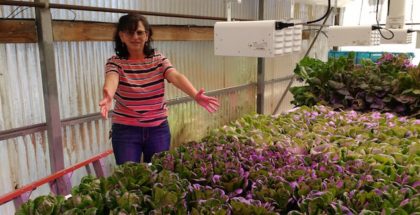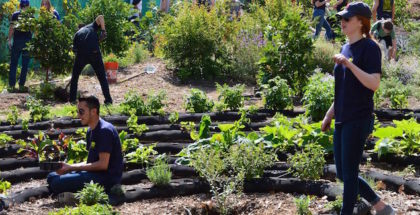Conference News
Grow Local OC Conference Delves into the Future of Urban Food Systems in Orange County and Beyond
November 15, 2016 | Robert Puro On Nov. 10-11 hundreds of attendees from across Southern California and beyond showed up for the inaugural Grow Local OC Conference: The Future of Urban Food Systems held Nov. 10-11 in Orange County, CA at California State University, Fullerton to learn more about the community and economic development potential of fostering local food systems in cities.
On Nov. 10-11 hundreds of attendees from across Southern California and beyond showed up for the inaugural Grow Local OC Conference: The Future of Urban Food Systems held Nov. 10-11 in Orange County, CA at California State University, Fullerton to learn more about the community and economic development potential of fostering local food systems in cities.
The conference attendees were treated to lectures from the foremost urban farming experts, entrepreneurs, and community advocates in the sustainable and local food system space. Topics explored by the speakers and panelists included the role that food plays in bridging the rural urban divide, Read More
LA Green Grounds Digs in to Build Urban Farms and Strengthen Community
October 24, 2016 | Judith Gerber
LA Green Grounds “Dig-in” in South Los Angeles. Photo courtesy of LA Green Grounds.
In Los Angeles, CA, community members involved in the urban farming and food justice movements are keenly aware of the food insecurity that is so prevalent in its South Los Angeles neighborhoods. It was this insufficient access to healthy, nutritious food that spurred Florence Nishida to co-found LA Green Grounds, a volunteer organization that works with residents of South L.A. to convert their front lawns and parkways into edible landscapes and urban farms.
“If you have a garden in the front yard it leads to conversation, and that’s the most important thing,” says Nishida. “The minute you start growing squash, tomatoes, or something people have never seen before, they start asking questions, and that starts the conversation. Those conversations lead to a sense of community.”
Making vegetables a visible part of the community is what has guided LA Green Grounds ever since its founding in 2010. Read More
SoCal Community College Hort Professor Prepares Students to Work in Indoor Farms of the Future
October 19, 2016 | Trish Popovitch
Students in Professor Valerie Loew’s Horticulture class at Fullerton College in Orange County, CA. Photo courtesy of Fullerton College.
When it comes to Controlled Environment Agriculture [CEA], Valerie Loew wants the U.S. to catch up with Europe and China before it’s too late.
“The rest of the world is so far ahead of us, because they are so limited with their own resources,” says Loew, who is professor and horticulture department head at Fullerton College in Southern California. “They are taking advantage of this technology way before us because we have sunshine and we have water; but we really don’t. Between Europe and China, the amount of greenhouses they have is just off the charts. We need to start catching up.” Read More
Episcopal Diocese Plants Seeds of Hope to Address Food Insecurity in Southern California
September 26, 2016 | Judith Gerber
Tim Alderson, executive director of Seeds of Hope, a food justice ministry that provides universal and affordable access to basic nutrition.
One of the largest diocese in the nation, the Episcopal Diocese of Los Angeles has made food justice a top priority. In 2013, it created Seeds of Hope, a food justice ministry that “provides universal and affordable access to basic nutrition,” says Seeds of Hope Executive Director, Tim Alderson. “In the six California counties that make up the Diocese of Los Angeles, that condition does not exist. Our job is to do what we can to address these issues.”
The idea for Seeds of Hope was conceived when Bishop Jon Bruno was diagnosed with leukemia and admitted for his final treatment at City of Hope. Though not his patient, he met endocrinologist Raynald Samoa, M.D. who was covering rounds. The two men spent over two hours talking about food related illnesses, food access issues and disparities of food health in communites. Dr. Samoa also knew Alderson, who was working on a farm project for City of Hope. Read More
California Amends Law to Allow Seed Libraries to Freely Share Noncommercial Seeds
September 20, 2016 | Jennie ParkMarking the most recent victory in a growing nationwide movement to promote the legality of seed libraries, The Seed Exchange Democracy Act (Assembly Bill 1810) was signed into law in California on September 9, 2016. The bill amends the “seed law” chapter of the state’s Food and Agricultural Code to expressly exempt seed libraries from onerous seed testing and labeling requirements. While necessary to protect buyers and consumers of commercial seeds, the impracticality of these requirements for community seed libraries would effectively cause them to shutter. California follows Minnesota, Nebraska and Illinois as the fourth state in the last 18 months to adopt laws favorable to seed sharing libraries.
Neil Thapar, a food and farm attorney at the Sustainable Economies Law Center (SELC) in Oakland, California who helped launch and draft the bill, explained how seed libraries work. “Seed libraries are essentially community-based initiatives where people can borrow seeds, plant them, and at the end of the season take back some seeds to replenish the seed stock at the library for other people to borrow.” He continues, “There really isn’t any ownership over those seeds. They’re held and stewarded by the library, but they’re shared freely throughout the community.” Read More
SoCal Seed Saving Library Seeks to Establish Generations of Seed Shepherds
September 14, 2016 | Karen Briner
David King, founder and chair of the Seed Library of Los Angeles (SLOLA). Photo Credit: Karen Briner.
David King grew up in Kansas where, despite being very poor, his family ate very well because they grew their own food on his grandfather’s three acres. This was where David got his first taste of seed saving.
As founder and chair of the Seed Library of Los Angeles (SLOLA), David’s been committed to teaching others how to save seeds. He says he was spurred into action to start the library in 2010, when the Obama administration approved GMO sugar beets.
“It was just too much,” he says. “I lost it.”
So on a cold, drizzly day in December of 2010, he held the first meeting of SLOLA. About 45 people showed up, more than he had expected, and 15 of the people who attended that first meeting are still active members today. As stated on their website, SLOLA was founded with the idea of enabling all who live in the Los Angeles area to have access to nutritious, pesticide-free, non-GMO food. Read More
Once the Largest Farming County in US, Los Angeles’s Agricultural Roots Laid Bare in New Book
September 2, 2016 | Karen Briner
Book cover image for “From Cows to Concrete: How Farming Transformed Los Angeles County” © 2016 by Rachel Surls and Judith Gerber, published by Angel City Press. All rights reserved. Image used with permission.
Only a bird’s eye view truly reveals the extent of Los Angeles’s urban sprawl; a city crossed by ribbons of highways supporting unending streams of cars, where even its river is mostly encased in concrete. It’s hard to imagine that this was once a fertile place of such abundance that its name conjured up images of vineyards, orange groves and orchards; in which neighborhoods were better known for their celery than their celebrities. A timely new book, From Cows to Concrete: the Rise and Fall of Farming in Los Angeles, by Rachel Surls and Judith Gerber explores Los Angeles’s past as the agricultural center of North America, tracing its precipitous path as it developed into a concrete metropolis. It’s a cautionary tale that also offers hope for the future in the form of the burgeoning urban farm movement and a renewed interest in community and backyard gardening.
Seedstock recently spoke to co-author, Rachel Surls, Sustainable Food Systems Advisor at the University of California where her job includes overseeing a volunteer program of 300 trained master gardeners who teach local communities sustainable gardening. Read More
Urban and Indoor Farms to Highlight Grow Local OC Conference’s “Future Farm Field Trip”
August 29, 2016 | seedstock
The Grow Local OC Conference field trip will stop at, from top left to right: Alegria Farm, Future Foods Farms, The Riverbed, and Urban Produce LLC.
The Grow Local OC: Future of Urban Food Systems Conference presented by Seedstock in partnership with the OC Food Access Coalition, and scheduled for Nov. 10 – 11, 2016, at California State University, Fullerton, will explore the community and economic development potential of fostering local food systems in cities.
The Future Farm Field Trip on Day 2 (Nov. 11) of the conference offers an excursion into the diversity of urban and state-of-the-art hydroponic and aquaponic agriculture operations in Orange County. Tour participants will be treated to lectures and sessions from pioneering farmers who are embracing innovative business models and growing systems to both increase food security and take advantage of the escalating demand for local food. Read More












